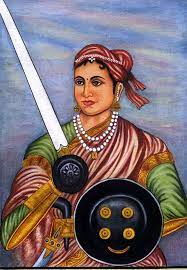 “Meri Jhansi nahi doongi!”
“Meri Jhansi nahi doongi!”
While these words have been written on the pages of history, Rani Laxmi Bai is one of few names of women who have made a huge impact in the 1857 freedom struggle of India. Still inspiring millions of daughters across the country, this fearless warrior represents patriotism in a true sense.
Born in a Brahmin family in 1835, she had a unconventional upbringing, as opposed to children of her age. Trained from childhood in martial arts, shooting and sword fighting, under the guidance of Tatya Tope, Rani Laxmi Bai was known fondly as “Manu”. She was married to Maharaj Gangadhar Rao Baba Sahib of Jhansi, where she assumed the status of a queen. She quickly gained the affection and loyalty of her subjects. However, with no surviving legal heir, the Maharaja adopted a son, just before his death, as per their tradition. The British refused to acknowledge the adopted son as the heir and started interfering in the small kingdom, while annexing it under their rule as per their Doctrine of Lapse.
The Queen was already asked to leave her rights and the throne and offered an annual pension. Yet, the brave Queen of Jhansi refused to budge and let her throne fall into British hands. By that time, an uprising had already started across India to foil plans of British to usurp India. Under the command of Sir Hugh Rose, the British managed to reach the fort of Jhansi to capture it. The battle went for two weeks and the Queen fought with valor and courage, however lost the battle. It is reported that she used to carry her son on her back on the battlefield. With her son and a few trusted followers, she escaped to the fort of Gwalior, to continue her battle against the British. It has also been reported that many villagers refused to give them refuge fearing the British.
The British had now recognized her as a rebel, who had tremendous potential, hence had made immediate plans to capture her. Dressed as a soldier, the 29-year old gallant Queen fought fearlessly in 1858 at Gwalior, despite lack of resources. English writers who have written an account of her war skills and strategies, describe that the courageous Ranee was at the forefront, battling till her very last breath even when her army was thinning. She fell down after she was struck by bullets and was immediately cremated as per her last wishes, untouched by the enemies.
Despite her loss, she has set an unmatched example, which was quite rare during those times, especially when role of women were confined and limited to household activities. She certainly planted seeds of patriotism among future leaders of the country and still remains one of the most celebrated war hero.
“We fight for independence. In the words of Lord Krishna, we will if we are victorious, enjoy the fruits of victory, if defeated and killed on the field of battle, we shall surely earn eternal glory and salvation.”
Birth Score – 5/5
Pride Score – 5/5
Undoubtedly, an impressive 10/10 Notable Brahmin Score.